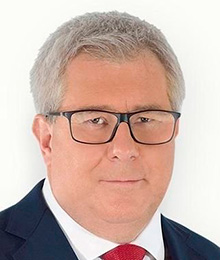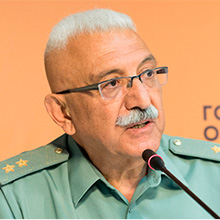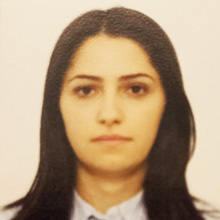
After 30 Years of Modern Statehood Armenia Has Little to Celebrate  By Benyamin POGHOSYAN, PhD, Chairman, Center for Political and Economic Strategic Studies By Benyamin POGHOSYAN, PhD, Chairman, Center for Political and Economic Strategic Studies
Armenia is celebrating the 30th anniversary of its independence but whilst it has all the attributes of a modern state a lot of its institutions are hollow. There is much that can be done, and if it acts reasonably, Armenia can celebrate its 50th anniversary of independence in twenty years’ time in a much more positive atmosphere.
On 21 September 2021, Armenia celebrates the 30th anniversary of its independence. For a nation with at least 3500 years of history, this may not seem a very impressive record. However, since 1045 AD Armenia has never witnessed such a long period of independent statehood in the Armenian highland. Armenia enjoyed a brief period of independence in May 1918 - December 1920, after the collapse of the Russian Empire. However, these two and half years were marked by instability, conflicts, widespread famine, and poverty.READ MORE
- EGF Editor |
Published on EGF: 22.09.2021
| External Relations
-
Uzbekistan Presidential Election Campaign Gets Underway  By Ryszard Czarnecki, Member of European Parliament By Ryszard Czarnecki, Member of European Parliament
Uzbek Presidential elections are scheduled to be held on October 24, 2021. These will be the sixth Presidential elections that will take place in the independent country. In the previous Presidential elections held in 2016, Shavkat Mirziyoyev emerged as the winner. Mirziyoyev is all set to run for a second term as the long ruling Liberal Democratic party will nominate him again.
Uzbekistan’s Central Electoral Commission has invited observers from the Parliamentary Assembly of the Council of Europe and the Office for Democratic Institutions and Human Rights (ODIHR) of the Organisation for Security and Cooperation in Europe (OSCE). Narzulla Oblomurodov, leader of Ecological Party of Uzbekistan; Bahrom Abduhalimov, head of Adolat Social Democratic Party, and Alisher Kadirov, chair of Democrat Party of Milliy Tiklanish (National Revival), are the other leaders who have been nominated to run for the President. READ MORE
- EGF Editor |
Published on EGF: 14.09.2021
| External Relations
-
Armenia and Turkey Try Again to Normalise Relations. This Time It May Work  By Benyamin POGHOSYAN, PhD, Chairman, Center for Political and Economic Strategic Studies By Benyamin POGHOSYAN, PhD, Chairman, Center for Political and Economic Strategic Studies
The possible normalisation of Armenia–Turkey relations have always been in the spotlight of the South Caucasus geopolitics. Turkey recognised Armenian independence back in 1991 but refused to establish diplomatic relations, and in April 1993 closed its border with Armenia in response to the advance of Armenian forces in the first Karabakh war. Since then, Turkey has put forward several preconditions for normalising relations with Armenia: the withdrawal of Armenian forces from Karabakh, the end to the Armenian genocide international recognition campaign, and the official recognition of Armenia–Turkey borders by independent Armenia. At the same time, Armenia–Turkey relations were a part of the broader regional geopolitics. Russia struggled to regain its influence in the South Caucasus while the US viewed the emerging Turkey–Georgia–Azerbaijan strategic partnership as a critical tool to counter Russian efforts. READ MORE
- EGF Editor |
Published on EGF: 14.09.2021
| External Relations
-
Turkey Takes Advantage from Crimean Platform to Enhance Its Leverage against Russia  By Hayk KOTANJIAN, Lieutenant General (ret), Professor of RA, RF, USA (strategic security studies), Lazarev Club Board Member By Hayk KOTANJIAN, Lieutenant General (ret), Professor of RA, RF, USA (strategic security studies), Lazarev Club Board Member
On the eve of the 30th anniversary of Ukraine, on August 23, 2021, at the initiative of President of Ukraine Zelensky, the Crimean Platform summit was held with the participation of 46 states and international organizations. The establishment of the platform with the goal of its long-term functioning was announced as one of the main events in the framework of the celebration of the 30th anniversary of independence of Ukraine. According to the President of Ukraine Vladimir Zelensky, the launch of the platform will introduce the problem of "de-occupation of the Crimea" into the international agenda on a regular political and diplomatic basis. READ MORE
- EGF Editor |
Published on EGF: 04.09.2021
| External Relations
-
The Great Game in the Levant: Russia’s Interests in Lebanon  By Yeghia TASHJIAN, Beirut-based regional analyst and researcher, columnist, "The Armenian Weekly” By Yeghia TASHJIAN, Beirut-based regional analyst and researcher, columnist, "The Armenian Weekly”
Like other regional powers, Russia has taken major steps to advance its geopolitical interests in the Levant. With the goals of expanding its influence and control the vast energy resources in the region. Although it only has a naval military base in Tartus (Syria) and no borders on the Mediterranean Sea, Russia has managed to exert its influence around nearby countries, including Lebanon. The perception of Lebanon as part of its Syrian stake encourages Moscow to strive to capitalize on its influence in the region after intervening in the Syrian conflict. In the last few years, Russia started playing a larger role in Lebanon following the growing civil unrest in Syria and the defeat of ISIS. READ MORE
- EGF Editor |
Published on EGF: 04.09.2021
| External Relations
-
The U.S. Policy in the South Caucasus after the 2020 Karabakh War  By Benyamin POGHOSYAN, PhD, Chairman, Center for Political and Economic Strategic Studies By Benyamin POGHOSYAN, PhD, Chairman, Center for Political and Economic Strategic Studies
The 2020 Karabakh war has significantly impacted the regional dynamics in the South Caucasus. Experts and pundits have not come yet to a unified approach regarding the reasons and implications of the war. However, many agree that the primary beneficiaries of the war were Russia and Turkey. Kremlin has reached perhaps its main goal in Karabakh – to put Russian boots on the ground, while it has also significantly increased its military presence in Armenia. Turkey has cemented its presence in Azerbaijan as now a large part of Azerbaijani society believes that without Turkey’s overt support and involvement, Baku could not win the war. Turkey also is a part of the Joint Monitoring Centre operating in the Aghdam region of Azerbaijan, though Turkey hoped to have more military involvement in the post-war Karabakh. READ MORE
- EGF Editor |
Published on EGF: 03.09.2021
| External Relations
-
An Impressive EU Aid Package to Armenia Does not Solve Yerevan’s Dilemma on Karabakh  By Benyamin Poghosyan, PhD, Chairman, Center for Political and Economic Strategic Studies By Benyamin Poghosyan, PhD, Chairman, Center for Political and Economic Strategic Studies
The EU has thrown Armenia an economic lifeline, but Yerevan has a stark choice ahead: either to use its economic resources to modernise its military and ensure that the Armenian population left in Karabakh is protected, or to create conditions for the Armenians in Karabakh to gradually settle in Armenia.
The EU has always perceived the South Caucasus as a neighbouring area between Europe, the Middle East, and Central Asia. The South Caucasus was never part of the EU's vital interests, but the Europeans were not indifferent to the region's fate. After the collapse of the Soviet Union, the EU signed Partnership and Cooperation Agreements with South Caucasus Republics, and later included the region into the European Neighbourhood policy. The next phase in EU-South Caucasus relations was the launch of the Eastern Partnership initiative and the inclusion of Armenia, Azerbaijan, and Georgia into the program. READ MORE
- EGF Editor |
Published on EGF: 27.07.2021
| External Relations
-
To Open Transport Links in the South Caucasus, Azerbaijan Needs to Avoid the term “Zangezur Corridor”  By Benyamin Poghosyan, PhD, Chairman, Center for Political and Economic Strategic Studies By Benyamin Poghosyan, PhD, Chairman, Center for Political and Economic Strategic Studies
Armenia always supported the idea of restoring communications and developing economic relations with Azerbaijan as a tangible way of confidence building. However Azerbaijan has to give up its inflammatory and disruptive rhetoric about the "Zangezur Corridor", and its thinly veiled threats to take over the Syunik province from Armenia.
The 10 November 2020 tripartite statement signed by Armenia, Azerbaijan and Russia ended the war in Nagorno Karabakh, but evidently, did not bring peace to the region. A range of complex issues remain to be settled – the future of Nagorno Karabakh, relations between Armenia and Azerbaijan, and the security dynamics of the broader region. Given the Russian military presence in Karabakh, the region's future now mostly depends on the Kremlin, and neither Armenia nor Azerbaijan has much room for manoeuvre here. The status of Karabakh will remain a topic in bilateral Russia–Azerbaijan and Russia–Armenia discussions, but Moscow will do whatever it thinks it is necessary to do. READ MORE
- EGF Editor |
Published on EGF: 19.07.2021
| External Relations
-
Armenian Foreign Policy in the Context of the Transformation of Global Order  By Lilit Galstyan, Senior Research Fellow, Academy of Political Studies, Yerevan By Lilit Galstyan, Senior Research Fellow, Academy of Political Studies, Yerevan
The end of the Cold War and the collapse of the Soviet Union have ushered in hopes of humanity's happy and harmonious future. The ideas such as "End of history" became very popular both within academic circles and with policymakers. There was a widespread belief that the entire planet would live under liberal democracy, and inter-state conflicts will become bad memories from history. However, the beginning of the XXI century crushed these hopes. Russia - West relations started to deteriorate after the 2004 Orange Revolution in Ukraine, while the 2014 Crimean crisis brought bilateral relations to the lowest point since the end of the Cold War. Meanwhile, the astonishing Chinese economic growth and the emergence of the multi-million middle class did not bring about political changes in China. READ MORE
- EGF Editor |
Published on EGF: 19.07.2021
| External Relations
-
Containing China Is No Longer Possible Despite the Fact that Many Want To  By Benyamin Poghosyan, PhD, Chairman, Center for Political and Economic Strategic Studies By Benyamin Poghosyan, PhD, Chairman, Center for Political and Economic Strategic Studies
China was on everyone's lips at numerous summits and international gatherings in the last days and weeks. "China will be among the key world players throughout the 21st century; it will be the number one economic power, and all have to accept and adapt to this reality. Many are not happy with this prospect and would like to prevent it from becoming a reality, but no one has the necessary capacity to contain China, despite the fact that many want to, for the moment for doing that has passed."
While many states make efforts to eventually overcome the outcomes of the COVID 19 pandemic through a large-scale vaccination process, and seek to return to the pre-2020 life, geopolitics, somehow pushed to the corner by the disease, returns to the spotlight. Recent weeks saw a chain of global summits – G7, NATO, and the USA-Russia meeting. The world leaders discussed many topics – climate change, the restoration of the transatlantic alliance, relations with Russia. However, the most repeated word in all these gatherings was China. “Rise of China”, “China's challenge”, “assertive China”, “China-led world order”, “China hegemony in Asia” – this is perhaps not the complete list of China-related phrases. READ MORE
- EGF Editor |
Published on EGF: 07.07.2021
| External Relations
-
|
|
